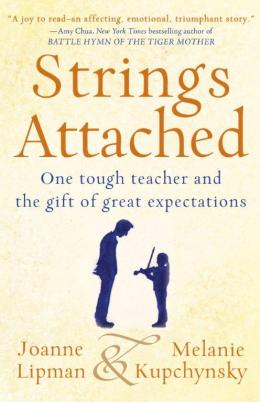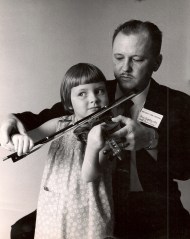
The authors of Strings Attached: One Tough Teacher and the Gift of Great Expectations, knew they would get pushback from their admiration of the harsh but successful teaching methods of a music teacher named Jerry Kupchynsky—known to several generations of students as “Mr. K.” But the duo, who have know each other since preschool, didn’t expect the overwhelming groundswell of support for his brand of tough love.
(READ: An excerpt from Strings Attached: One Tough Teacher and the Gift of Great Expectations)
Says co-author Joanne Lipman, “We’re getting notes from teachers as well as parents that simply say, “Amen!” The book seems to have tapped a deep pent-up frustration about helicopter parenting and underachieving students. TIME reached out by email to authors Lipman, one of America’s leading journalists and a former viola student of Mr K’s, and Melanie Kupchynsky, a violinist with the Chicago Symphany Orchestra—and Mr. K’s daughter:
.
TIME: You write admiringly about Mr. K’s teaching techniques. Were you as admiring when he was actually teaching you?
JOANNE LIPMAN: No! He literally was the toughest teacher ever. He had a thick Ukrainian accent, and if he heard a wrong note, he would stop the whole orchestra and scream “Who eez DEAF in first violin?” or “Cellos sound like hippopotamus rising up through bottom of river!” He never praised us. His highest compliment—and you worked your tail off for it—was “not bad.” We were terrified.
But I found as an adult, looking back, that the fact he didn’t coddle his students gave us some pretty crucial life skills: resilience, perseverance, and a thick skin. And of course a lifelong love of music.
At first glance, by contemporary standards, his methods can seem too harsh. Were they?
JL: If he were teaching today, he’d probably be fired. Parents would be outraged. They’d yell at the principal if he singled out their kid for playing a wrong note. They’d call a lawyer if he suggested their child was “deaf!”
And yet, you can’t argue with the results. His students went on to great success not just in music but in medicine, law, academia and other fields. And most of them had a great deal of gratitude for him later on in life.
Can teachers now learn from the way Mr. K inspired children?
JL: Interestingly enough, a lot of Mr. K’s methods, while out of fashion, are being validated by new research. For example, a study of the most effective teachers in the worst schools in LA found that the unifying factor among all was that they are strict. Psychologist Angela Duckworth at the University of Pennsylvania, who just won a MacArthur “genius” grant, found that grit—defined as passion and perseverance for long term goals—is a better predictor of success than SAT scores.
And psychologist Carol Dweck has gotten a lot of attention for her research that shows overpraising children can undermine their confidence. She found that children will actually perform better if you commend them for “hard work” rather than telling them that they are “smart.” So perhaps Mr. K was ahead of his time.
Are you afraid there are teachers who would see your praise for this style of teaching as condoning corporal punishment? What kind of feedback have you been getting?
JL: Mr K was tough, but didn’t engage in corporal punishment of his students. The reaction to Strings Attached has been overwhelming—and surprising. We expected a lot of pushback about his harsh methods. But we’ve seen instead a groundswell of support for tough love. We’re getting notes from teachers as well as parents that simply say “Amen!” Strings Attached seems to have tapped into a deep, pent-up frustration people are feeling about education, helicopter parenting, and the coddling of kids.
Do either of you have children? If so, how did this type of learning influence your parenting styles? What have you emulated and what have you avoided?
MELANIE KUPCHYNSKY: Yes, I have three children, all in college now. All three studied the violin and were taken to operas and concerts from a very early age. And I do mean early! My firstborn was at a July 4th concert only 3 weeks after his birth. I absolutely emulated my dad’s parenting style, forced my kids to practice their instruments, demanded their best efforts at all times, and placed education and learning at the very top of our priorities list.
We also did what my father taught me, and took our instruments to places where there were those in need: nursing homes, hospitals and elderly shut-ins. This giving back, and sharing of music, is one of our family values and I am proud to see my children now carrying on this tradition in their own ways.
Of course, I didn’t emulate him in every way. My husband and I encouraged our children try lots of activities including sports, and we did not spank. I tried not to yell as much as my dad did, though I probably yelled more than I wish I had!
But there are children who might not thrive under this sort of strictness…
JL: Mr. K’s methods aren’t for everyone. I don’t think any teaching method is one-size-fits-all. In Strings Attached we tried to highlight some students who felt his wasn’t the right approach for them, even if as adults they understood the impetus behind it.
MK: Different children require different types of parenting and teaching – but I can’t think of a child who wouldn’t benefit from music education.
Melanie, you write that your mother’s illness was difficult for your father. In what ways? Was it hard on you, too? Do you think there’s more openness about illnesses like MS than when you were growing up?
MK: Of course it was hard on all of us having my mother in a wheelchair. It was especially hard on her. But it also strengthened us. It made me stronger for sure. What doesn’t kill you make you stronger. Back then, there weren’t as many accommodations to help handicapped people as there are now. Even as simple thing as going out to dinner was very difficult, and therefore we didn’t do it much. But in the end it made me a stronger person—and also a person who’s grateful for my health and for everything that I can do for my children.
In what ways did Mr. K’s wartime experiences shape his personality and teaching?
MK: My dad’s school years coincided with World War II, and he spent much of that on the run or in refugee camps. He prized his education and had to work incredibly hard to get it. It was so difficult for him simply to stay in school that later in life, he had no patience for anyone who would squander or waste a chance to get an education. That carried over into his classroom.
Melanie, your family has faced many challenges and suffering. How did your father and your family cope with that?
MK: Music was the most powerful tool that we all used to cope with challenges. My mother conducted a choir when she was confined to the hospital; my sister immersed herself in violin and teaching; and my father and I immersed ourselves in classical music—listening, performing and teaching. Music became the core of our existence, not just the playing of it, but the connection and the sharing and the people who came to us through music – his students and colleagues—these are the people who we bonded with through our music and these are the people who helped get us through.
Joanne, you’ve said that you’d like to see your book “start a conversation.” Of what kind?
JL: Strings Attached tells the story of one remarkable teacher. But the book really is about the mentors we all have in our own lives—and about tough love. Almost everyone has someone like Mr. K in their past, that person who encouraged them to dream bigger and reach higher—who made all the difference. Often it’s someone they didn’t appreciate at the time, who kicked their butt and cut them no slack! We’d like readers to come away from the book thinking about who is that person in their own life.
Strings Attached is also stirring up an important conversation about our children. As I said, it seems to have tapped into a deep, pent-up frustration people are feeling about education, helicopter parenting, and the coddling of kids. And there’s no more important conversation to have than that.
Melanie, was your father as strict at home as he was in the classroom? Did his approach change as your mother got ill? Did his parenting style he adjust to being more or less a single parent?
MK: My father was probably even stricter at home than he was in the classroom. As my mother’s health declined, and the parenting duties fell more onto his shoulders, running a tight ship at home became of his main coping techniques. When he was faced with two teenaged girls, and Stephanie’s rebellion, he was determined not to let it get the best of him. Through sheer force of will and determination he fought every step of the way to instill his values in us, and required us to do our best at all times, study, practice, maintain our home and behave respectfully and properly. Ultimately he succeeded, and in the end, both Stephanie and I were grateful to him.
Tell us about the shock of learning about your father’s wartime experience. When did you find out? Had he ever talked about it when you were growing up?
MK: While I was growing up, I heard snatches of conversation between my parents where my father referred to the communists, and even though I didn’t know what a communist was, I knew that my father was afraid of them. He barely spoke of the war, though he did love to tell stories of his grandfather’s farm back in the “old country”. In fact, he kept so many of the details of his wartime experience private that I was stunned by what our research revealed about the hardships he endured. My father was an optimist, and preferred to focus on the present and the positive, and to discipline himself in order to hold his negative emotions inside. He was also an intensely private individual. Most of what I know about the worst of his wartime experiences came to light after his death.
Did he change after your sister’s disappearance?
MK: After Steph disappeared, my father brought all his strength to bear, and called on every resource that he had in order to continue to search and hope and to not let despair overcome him. All of the qualities he tried to instill in his students—discipline, focus, perseverance—became even more crucial. He drew even closer to me, my husband and children, and spent as much time with us as possible, even traveling on a few tours with the Chicago Symphony as my guest and companion. He mellowed considerably, and with his grandchildren was much softer and more sentimental than he had ever been as a parent. He also immersed himself even more in music, attending more concerts and playing recordings and the radio constantly when at home.



